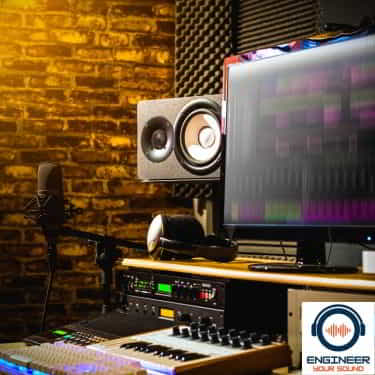I have been writing and producing music for nearly 15 years now. In that time, I have experimented and worked with various speaker types.
Many new music producers wonder if they need a “special type” of speaker for music production and if the types of speakers advertised for music production make a difference.
In short, yes, the type of speakers you use (called studio monitors) to produce music impacts the sound, especially if you are using these speakers to mix or master sound.
The best type of speakers for music production are studio monitors. Studio monitors provide accurate and detailed sound reproduction, allowing producers to hear their music clearly and precisely.
I will explore the nuances between studio and normal speakers in this article, explaining their role in a music studio. I’ll share some personal experiences that exemplify the importance of selecting the correct speakers for music production.

What Type Of Speakers Are Best For Music Production?
Regarding music production, the speaker type that reigns supreme is studio monitors. These are not your average speakers. They are specifically designed for the precise task of giving a flat and accurate representation of your audio.
Normal speakers (aka Hi-Fi speakers) often colour the sound to make it more pleasant to general listeners, but studio monitors do the opposite – they reveal every detail, every flaw, every quality of your audio so you can make informed decisions during mixing and mastering.
Top-of-the-line studio monitors popular among music producers include the KRK Rokit, Yamaha HS, Focal Shape, and Genelec 8010A. Each choice brings unique qualities, but they all share the fundamental reliability characteristic in delivering accurate and detailed sound reproduction.
Remember, the aim is to hear your music in its purest form to understand how it truly sounds; studio monitors are the best at this job.
Do You Need Specific Speakers For Music Production?
The need for specific speakers, namely studio monitors, cannot be overstated regarding music production. The reason is quite simple: accuracy.
Hi-fi speakers are designed to make the music sound good, often enhancing certain frequencies to appeal to consumer listening preferences. However, when producing music, you need a true, uncoloured representation of your sound.
You need to hear all the imperfections and nuances to make necessary adjustments. This is where studio monitors step in. They offer a flat frequency response, which means they don’t artificially boost any frequencies. Each note played will be heard exactly as intended to sound, making it an essential tool for music production.
So, if you’re serious about your music production journey, investing in a pair of good studio monitors is a must.
What Speakers Are In Professional Studios?
You’ll typically find high-quality studio monitors in professional music studios designed to deliver accurate, uncoloured sound. The selection of studio monitors can vary greatly depending on the studio’s specialization and the audio engineer’s preference.
For instance, the Yamaha HS series, especially the HS8, offers excellent sound reproduction and is favoured by many studios around the globe. You will find a pair of Yamaha NS-10s in nearly every professional recording studio worldwide. The Yamaha NS-10s are famous for producing a flat, revealing sound.
The KRK Rokit series is another popular choice, revered for its clarity and depth. For higher-end studios, the Focal Shape series and Genelec 8010A are frequently opted for, given their unmatched precision and detail.
Regardless of brand or model, the commonality amongst all these speakers is their flat frequency response, allowing every detail in the music to be heard unaltered and as intended.
What Is The Difference Between Studio Speakers And Normal Speakers?
The key difference between studio speakers and normal everyday speakers, such as hi-fi, lies in sound reproduction. Normal speakers, or consumer speakers, are designed to make the music sound pleasing to the listener. They often enhance certain frequencies to make the sound ‘fuller’ or ‘richer’, and this can vary across different brands and models.
On the other hand, studio monitors are designed for accuracy and detail. They deliver a flat frequency response, meaning they do not artificially boost any aspect of the sound. This allows producers to hear the truest representation of their music, warts and all.
The purpose is to reveal every nuance, detail, and imperfection in the audio so that it can be critically analyzed and adjusted during mixing and mastering.
In short, while normal speakers are designed for enjoyment, studio monitors are designed for work. They are a critical tool for anyone involved in music production, providing the transparency and honesty needed to create the best possible mix.
What Makes A Good Studio Speaker?
A good studio speaker is characterized by accuracy, detail, and flat frequency response. This means it doesn’t boost or decrease frequencies, providing the truest representation of the sound produced.
A good monitor offers a wide frequency range – from the deepest lows to the highest highs – ensuring no detail is lost or obscured.
The construction, design, and materials used by the speaker also play a crucial role. The cabinet should be rigid and well-damped to prevent resonance, and the drivers should be high quality to ensure long-lasting performance.
Additionally, the speaker should have a well-designed crossover for proper distribution of frequencies to the drivers.
A good studio monitor also maintains its accuracy across a wide range of volumes – it should sound as accurate at low volumes as high ones.
What Speakers Are Best For Sound Quality?
Regarding the best speakers for sound quality, several factors come into play, such as the listener’s preferences, the room acoustics, and the type of audio being played. However, certain models stand out for their exceptional performance and consistency.
For instance, the KEF LS50 Wireless II is highly acclaimed for its pristine sound quality and innovative design. This bookshelf speaker set offers a balanced and detailed soundstage, making it a favourite among audiophiles.
The Klipsch Forte III, a floor-standing speaker, is renowned for its dynamic and engaging sound, capable of filling even large rooms.
For studio-quality sound, the Genelec 8010A offers exceptional detail and neutrality, making it a staple in professional recording studios worldwide.
Lastly, the Sonos One ranks high for sound quality among smart speakers, providing both convenience and impressive audio performance. It’s important to remember, though, that the “best” speaker often depends on individual needs and preferences.
Final Thoughts
The type of speaker you choose for music production largely depends on your specific needs and preferences as a producer. Studio monitors, with their accurate sound reproduction, are a cornerstone in any serious music production setup.
Brands and models may vary, but the principle remains the same: to facilitate the creation of the best possible mix by providing a true, unaltered representation of the sound.
While these professional-grade speakers may not necessarily enhance the sound like consumer speakers do for a pleasurable listening experience, they allow producers to hear every detail in the music, exposing all imperfections that need to be addressed.
Ultimately, investing in high-quality studio monitors is a critical step in your journey to producing great music.
